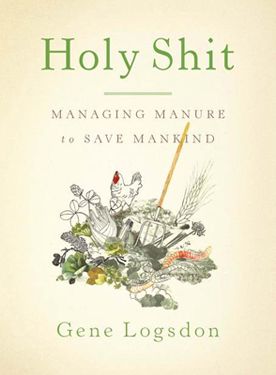 “Holy Shit!” is damned right. Here’s a book about just that — manure. Precious, plentiful, misunderstood manure. Cow manure, horse poop, human feces, dog shit, you name it, Gene Logsdon writes about it.
“Holy Shit!” is damned right. Here’s a book about just that — manure. Precious, plentiful, misunderstood manure. Cow manure, horse poop, human feces, dog shit, you name it, Gene Logsdon writes about it.
In this recent book (affiliate link) from good ol’ contrary farmer Gene Logsdon, the wonder and mystery and amazing fertilizing power of manure is revealed. Simultaneously, the book will make you wonder why we let this, uh, natural resource cause so much harm when it could be doing so much good! “Managing manure to save mankind” is no light statement, but it’s very, very real.
Farmer or not, Holy Shit has appeal beyond those folks living in the country and growing crops like our own Mr. Logsdon has been doing for dozens of years. Logsdon dives into the proverbial pile and beautifully (and with great wit) describes the power of poop in its amazing ability to fertilize and enrich the world’s soil, instead of polluting our waterways and air.
I learned, for instance, that some places have the nerve to burn the stuff, on top of letting it pollute the waterways! Why do we spend billions of dollars each year letting manure cause so much harm when it is worth so much?
Currently, much of the industrialized world flushes their business away, never to be seen again, but Logsdon bravely explains why this practice is unsustainable, and could be reversed to help build up the soil fertility that has been lost through years of exploitative farming practices.
Logsdon’s musing on cow pies and road apples is inspirational, and that’s no joke. With years of firsthand experience, Logsdon is the real deal: he speaks what he preaches, and provides many an example of how to better handle the vast loads of shit this world’s people and animals produce.
Environmentalists, farmers, gardnerers, and everyday citizen take note: this is an important (and very entertaining) read about something we deal with everyday, but actually have extremely little understanding of.


Shawn "The Puru" Shafner
Thank you so much for covering this book on your blog! As creator of The People’s Own Organic Power Project (www.thePOOPproject.org), I’m on a mission to get people thinking differently about how we deal with “waste.” Logsdon makes a number of excellent points, and seeing as our supplies of mined Phosphorous are going to peak around 2050, we have to start looking for other fertilizer sources. What a wonderful world it would be if we could break the cycle of “waste” and begin one of never-ending value.
Steve Savage
Waste is indeed a terrible thing to waste, but to do it right is non-trivial. With current energy prices, manure and municipal sludge are more valuable as an energy source than as a fertilizer. As much as possible these waste streams should be put through an anaerobic digester process to generate and capture methane. It would be ideal to also capture the nitrogen that is lost as ammonia in that process or in composting. The fiber and small amounts of nitrogen and phosphorus that are left are useful as soil amendments but they won’t begin to provide what is needed for fertilizing the world food supply. About 5% of US crops are fertilized with manure etc and it could never be much more than that.
Bob Kinford
If you think wasting manure is bad, you don’t know what bad is. All the “problems” of carbon dioxide and what does the government come up with ? Coming up with an artificial market on trading carbon credits. Plants convert carbon dioxide to air…fermenting algae creates methane gas… Why not pump carbon dioxide into algae tanks which would convert the carbon dioxide…Then let the algae ferment to produce electricity (or fuel for cars) and use the algae for fertilizer?
SBG
@ Steve Savage
Your argument may hold substance under the NPK agricultural paradigm but farmers are increasingly waking up to the fact that creating healthy living topsoils is essential if they are to prosper in the long run. History has proven time and time again that civilisations are dependent on soil health.
Building soils throught the addition of composted organic matter and manure has an immense range of benefits that are routinely overlooked by traditional agronomists. You can not view manure simply as source of nitrogen.
The use of the synthetic fertilizers (as you advocate) is responsible for unparralled levels of soil degradation, to the point where agricultural productivity is only maintained through the continued input of synthetic chemicals and genetically modified crops. The system is at breaking point.
You also fail to make the connection that synthetic fertilizers are essentially solid energy due to the industrial processing and long distance transport required to get them into the fields.
What is the point of making energy from a highly beneficial organic soil ammendment so that it can be used to create inferior synthetic products?